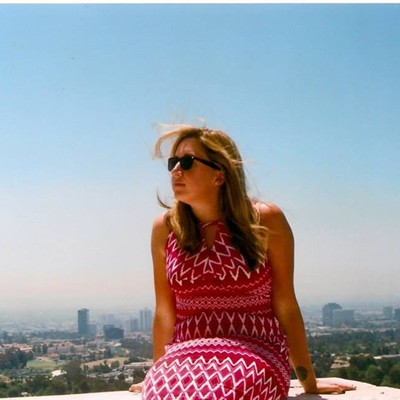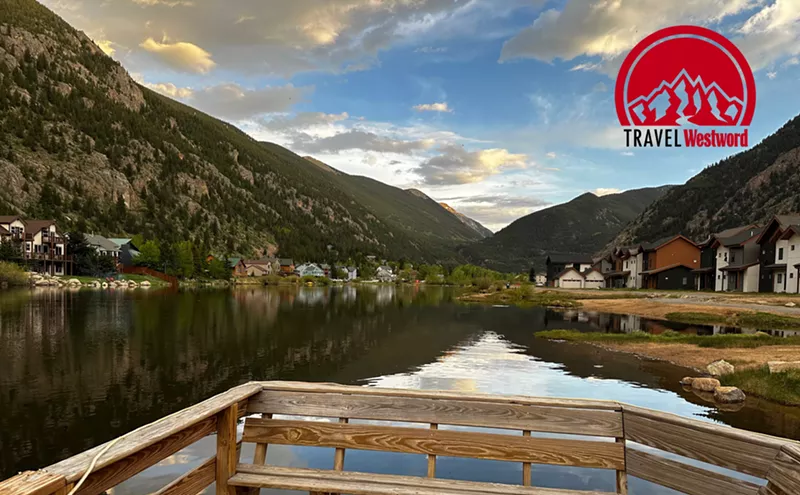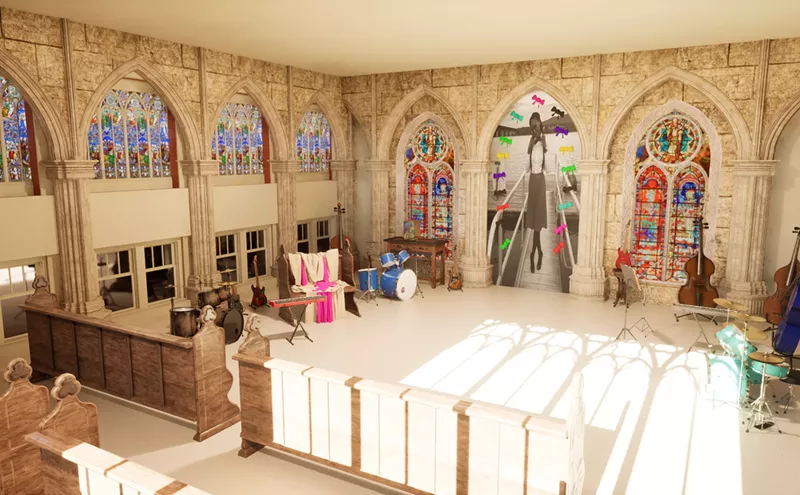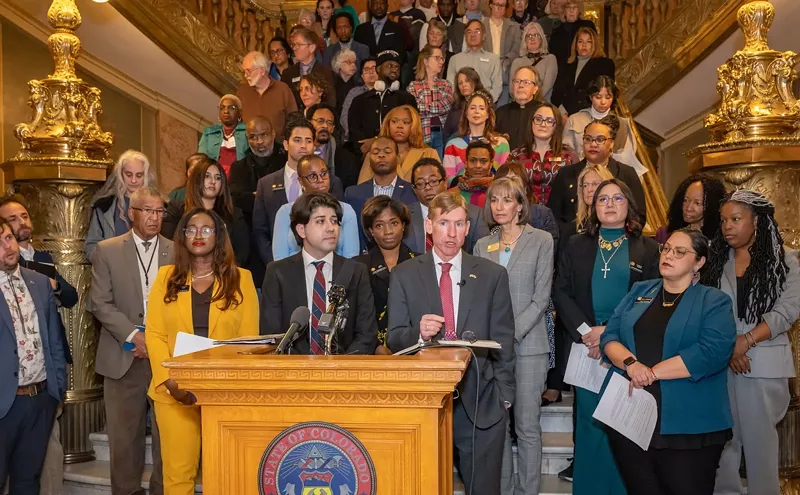Lewis, who attended Evangel University and worked as a schoolteacher before launching the love lives of the Old Order into the mainstream, might seem an unlikely candidate to have revolutionized romance. Since 1965, the author has lived in Colorado Springs, far from her fictional home of Lancaster County, Pennsylvania, though she spends six days a week channeling the other side. But stroll through those same aisles, and you'll find hundreds of additions to this PG and perplexing take on modern romance. (Two of Lewis's books have even hit the romantic jackpot by being reinterpreted into Lifetime and Hallmark movies.) Forget corset-rippers: These are bonnet-busters.
In honor of the annual day devoted to a mass-produced take on love -- February 14 -- we spoke to the author of more than seventy novels in much the same way she speaks to many of her sources. E-mailing us back from her Colorado Springs home, Lewis touched on her writing techniques, research methods and personal heritage in the Anabaptist community. And it turns out that interviewing people snail mail-style teaches you a lot about patience.
Westword: You come from a Mennonite background on your mother's side. What originally sparked your interest in writing about Amish culture?Beverly Lewis: My initial interest in writing books set in Lancaster County's Amish community was a result of encountering various Amish families during my childhood. Growing up around Amish farmland, I enjoyed the opportunity to witness firsthand their love of family, of the domestic arts -- sewing, quilting, cooking, baking -- as well as seeing them live out their tradition of faith in such a unique way.
What is your first personal memory of Amish culture? How did your first impression adapt over time?
One of my earliest memories was of seeing horse-drawn buggies with little Amish children peering out at me from the back, their legs dangling as they jabbered in Pennsylvania Dutch, sometimes pointing and giggling at my family following slowly behind them in our car. And also of being invited to our Amish friends' farmhouse and sitting at a long wooden trestle table, being served a six-course supper by the older four of the thirteen children. I recall the Amish wife and mother talking rather openly with my own mother about not having as much work to do (especially in the kitchen) because of having many daughters. I was eight or nine years old, I believe. This impression has stayed with me largely because I had never seen adult women, let alone teenage girls, put together a feast for so many people so quickly.
How do you conduct your research?
I've stayed with two different Amish families during two separate summers. I had the pleasure of knowing my parents' Amish friends while growing up in Lancaster County. I continue to keep in touch with many of those Amish friends -- and their grown children, too.
I'm in touch with Amish friends and contacts through letters and phone calls (to their barn or shop phones). And I read various Amish-related periodicals, such as The Budget, and devotional magazines written primarily for Amish women. My Mennonite cousins also answer my questions by simply going over their back fences to ask an Amish neighbor! I'm also in Lancaster County two to three times per year visiting my mother's Mennonite relatives there, as well as Amish friends in Paradise, Strasburg and Newburg, Pennsylvania.
What are the challenges to writing about such a closed culture?
Stretching myself as an author to see through the eyes of an Amish protagonist and figuratively walking in their bare feet...attempting to understand life in a cloistered community ordered from the top down (God, father, husband, older brother, etc.).
What is the most common response to your books? Who is the audience for your writing?
My readers are legion and quite loyal, and I rarely hear a negative response; I must be rather spoiled in this regard. The typical comment from my readers is either "I stayed up all night reading your latest novel, because I couldn't put it down," or "Beverly, I wish you could write faster. I've finished your latest book and I have nothing else to read."
I have tens of thousands of letters and cards and even more e-mails from mostly women ranging from their thirties to seventies, though along with that age group, there are college-age girls and elderly women who stand in long lines to meet me during my book tours.
I've received surprisingly little criticism, although there have been a handful of Amish in Ohio, especially, who have pointed out the scriptural basis for their shunning practices, as if attempting to set me straight. The most common praise? "You originated Amish fiction, and you're still the best Amish author." I also hear from readers that they feel as if they're reading non-fiction, discovering an exotic community and getting a front-row-seat glimpse into the world of the Lancaster County Amish. They also repeatedly say they feel a bond with me, as their author-friend, and that I'm writing stories just for them
Click through to read about Lewis's Amish encounters in Colorado. How do you continue to adapt the stories as time goes on without them becoming staid? Do you ever find your role as the head of the genre restrictive as a writer?There is a plethora of topics to explore. I sometimes think I may never live long enough to explore all of the unique story lines I have either in my head or waiting in my computer file.
I'm a writer; it's not just what I do, but who I am. As I stated earlier, there are so many story lines and "leading ladies" flitting about in my head, waiting for their turn. I have great passion for my work.
What is the most common stereotype regarding the Amish community?
That they are more holy or sin less than the rest of us. What makes the Amish romance genre such a popular one across the spectrum?
I asked my Facebook readers recently what aspect of the Amish culture interests them the most. The answers ran the gamut from "their simplicity" to "the way they treat their children" and "they take care of their infirm and their elderly." Books written with Amish settings, whether they are considered romance novels or another type of genre, are part of a broader fascination. The truth is, readers are Amish-crazed and have been since my first novel was published in April of 1997. The "Old Ways" have an incredible draw: They remind us of how some of our grandparents and great-grandparents lived, with cookstoves and outhouses and well pumps.
How far is the romanticized version of Amish life from the truth?
My books are heavily researched and are read prior to publication by Old Order Amish contacts, as well as highly respected spokesmen for the Plain community in Lancaster County. I choose to portray the "People" as accurately as I possibly can, out of respect for my longtime Amish friends, who have been incredibly open to me because of my mother's Old Order Mennonite heritage. I merely mention my grandmother's maiden name, Ranck, and I'm welcomed in. What can we learn from the Amish about successful living techniques?
Oh, goodness, are they ever diligent businessmen and women! They are the hardest-working people I know, working from dawn to dusk. And they're honest, one of their hallmarks. They dislike ever signing a contract; their handshake and word is their bond. They band together to make work fun. There is no such thing as rewarding oneself with "fun" once a chore is accomplished. The fun is the work itself -- a difficult concept for Englishers to grasp. They are wary of borrowing money and typically pay with cash. Many of them are very well off, due to having saved a tenth of their gross income each month. (They also tithe another 10 percent of their income.) They care for their elderly, who live in little grandfather houses (called a "Dawdi Haus") built onto the main farmhouse. And they have an emergency relief fund available to church members in their district. It is also true that a barn can be raised in a single day.
What is your daily work schedule like?
I work six days a week, between six to ten hours per day, to produce two novels per year and, occasionally, a children's book as well. My mornings are largely focused on editing the 2,000-plus words I've written the day before. After lunch I do publicity work, including answering fan mail from my website, and I post on my Facebook fan page. I do interviews and write my daily word count in the mid- to late afternoon or evening.
Have you run into followers of the Amish and Mennonite communities in your time in Colorado Springs?
Yes, Old Order Mennonites, as well as some River Brethren. We've also traveled to Westcliffe to visit with Amish in that area who've come from various communities around the U.S., searching for land for their newly married young people.
Does it help to live in a state other than the one where your fiction focuses?
Not necessarily. My heart is constantly drawn back to my beloved Lancaster County. That is where my writing passion lies. However, with the convenience of texting, e-mail and Facebook, I'm easily able to connect with my consultants and research assistants there, as well as wait patiently for snail mail from Amish friends.












